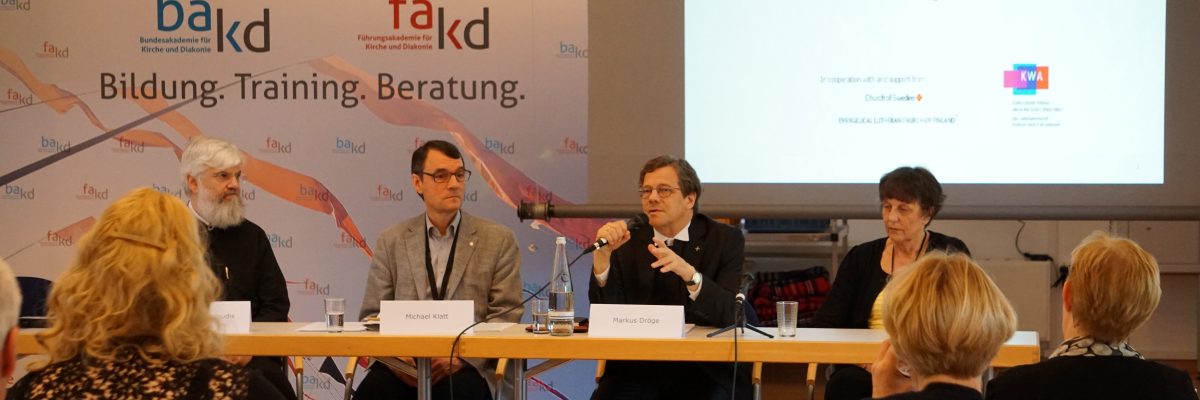Maailmanlaajuisesti edessämme on ehkä suuri muutos. Nykyisistä työpaikoista voi hävitä tai olennaisesti muuttua puolet tai kolmannes jo parin vuosikymmenen aikana. 1800-luvun alusta lähtenyt teollinen kehitys – oikeastaan vallankumous – on tullut uuteen taitekohtaan, jolla voi olla merkittäviä vaikutuksia työn, yhteiskunnan ja sosiaalisten verkostojen suhteen.
Euroopan kirkkojen konferenssin (EKK) yhteydessä toimiva työn ja arjen (Labour and Life) kysymyksiä tarkasteleva CALL- verkosto kokoontui näiden kysymysten äärelle huhtikuun lopussa Berliinissä.
Konferenssin johtopäätöksenä voi todeta, että vielä ei työelämä ole kohdannut radikaalia muutosta. Esimerkiksi alustatalouden parissa työskentelee globaalisti vain 0,5% työväestöstä (Suomessa vieläkin vähemmän). Kohtuullisen pitkään Suomessa on ollut ”vain” 20-30 niitä, jotka ovat tehneet työtä epäsäännöllisen työsopimuksen ehdoilla ja joilta on puuttunut vakituisen työn antama varmuus.
Ei-perinteiset työllistymistavat saattavat kuitenkin merkittävästi lisääntyä jatkossa myös Suomessa. Tutkijoiden näkemykset muutoksen suuruudesta ja aikataulusta vaihtelevat tällä hetkellä merkittävästi.
Kaikki viitteet ovat kuitenkin sen suuntaisia, että yhteiskunnan perinteinen keskiluokka ja sen ammatit joutuvat lähitulevaisuudessa koetukselle ja epäsäännöllinen työ lisääntyy.
Euroopassa kirkot eivät ole juurikaan heränneet muutoksen tuloon. Yhtäältä digitalisaatio voi merkittävästi auttaa kirkkojen erilaisia toimintamuotoja kuten viestintää tai suoraa vuorovaikutusta seurakuntalaisiin. Toisaalta työelämässä ahdingossa olevia ihmisryhmiä on syytä tukea eri tavoin.
Saksassa EKD (Saksan evankelinen kirkko) valmistelee digitalisaatioon liittyvää tiekarttaa. Työskentelyn on määrä valmistua syksyllä 2018. Myös Suomessa olisi syytä havahtua digitalisaation käänteeseen ja pyrkiä sekä kartoittamaan nykytilannetta että tekemään arvioita lähitulevaisuuden kysymyksistä.
Saksassa EKD (Saksan evankelinen kirkko) valmistelee digitalisaatioon liittyvää tiekarttaa. Työskentelyn on määrä valmistua syksyllä 2018. Myös Suomessa olisi syytä havahtua digitalisaation käänteeseen ja pyrkiä sekä kartoittamaan nykytilannetta että tekemään arvioita lähitulevaisuuden kysymyksistä.
Ohessa CALL-konferenssin lopuksi julkaistu englanninkielinen pääteemojen tiivistelmä sekä linkki EKK:n sivuille, jossa on lisämateriaalia aihepiiristä.
* * *
Digitalisation and the future of work and social relations
Rapid development and recent technological changes often named as digitalisation raise questions about its impact on work, society and social relations. Will digitalisation create during the coming decades a golden age of job creation or destroy labour and exploit several groups of workers?
The CALL network, who gathered in Berlin, explored these questions. The digitalisation process has to be shaped and churches, as a part of society, need to contribute – a key question is: How?
As Christians, we can celebrate technological achievements brought forth by human beings as created co-creators; at the same time our prophetic calling urges us never to lose sight of who are the victims of this development.
Newly emerging non-standard forms of work were recognised as needing to be regulated. The speed of change means that laws are not keeping up with circumstances.
In addition, education emerged as being a key factor for positive development within a cohesive society, and a further question was raised: What are people educated for? Education takes varied forms including general education, vocational training, life-long training and retraining in work places.
Digitalisation and its impact to work
Researchers have divided views concerning the effects of digitalisation. Some scholars say that up to a half or third of current working places will be changed or disappear; at the same time, new jobs will be created. Some scholars assume that new opportunities will cover the lost jobs. We are concerned that the amount of precarious and non-standard work may increase.
Basic social political tools to confront the problems can be: shorter working hours, employee ownership, guaranteed jobs programmes and basic income. These options need to be discussed in society and within political debates.
The challenge for churches is to be aware of these changes and especially to notice those who may be in danger of losing their work or income.
New forms of work
Structures of work are changing rapidly, and are likely to have consequences on families and communities. We had a closer look at two main new forms of platform work: Crowd Work and Work on Demand via Apps (such as UBER and Deliveroo). This can be positive in that it creates flexible work schedules. However, the status of the worker has become precarious since workers are being treated as self-employed when in fact they are not autonomous but rather subordinated.
To overcome this precarious status, there is a need for a standard minimum wage for platform work, and the need for social protection for the workers. The platform work makes work possible seven days a week, affecting work/life balance, causing work to dominate in life as whole. Rest and the use of free time to reflect is a key aspect of being human. This is why, for example, the protection of Sunday, as a day of rest, is an important matter and is under great pressure. Churches also might consider offering co-working spaces for crowd workers since they are typically isolated, and so this would help to provide a sense of community and social relations.
Social relations and social cohesion
There will be fewer middle skilled jobs, and more high skilled and low skilled work. Society is being polarised, and such polarisation means that many workers are likely to be out of jobs. Society will find that there are people out of work who need to retrain and learn new skills, but who may well become unemployed. Young people are particularly affected, and are at risk of both joblessness and depression. Changes in prospects can cause anxiety, discontent and a lack of security, which might lead to unrest and populism. Digitalisation makes it possible for companies to change outsourcing strategies quickly and frequently and this often has the effect that management decisions, which affect workers, are made far away from the work force. This development also undermines the political influence of local politicians in matters of local employment.
Parishes, which are in the local context, can contribute with meeting places for active reflection about values, social relations and can fill the gap of personal connection. Yet, all levels of churches should be involved, so at the macro level churches can influence social issues.
Conclusion
From this conference the participants took away some practical tools to engage with parishes and churches about the many issues raised through digitalisation. How do we live as Christians in an ever changing-world? The churches can provide a forum for reflection on local employment issues and support for those affected by these technological changes. The churches can also underline the significance of social justice and human dignity. Society is engaging with new models of communication that promise connectivity, but which are based more and more on profit. The churches are called to offer a model based on communion.
More than 50 participants attended the conference from European churches, many of whom had a long-standing expertise and experience of Christian reflection on work issues. The CALL network offers opportunities for a European reflection on labour from a theological and social ethical perspective. It is under the auspices of the Conference of European Churches (CEC). We engaged in dialogue with individuals who represented different bodies supported the conference: The ILO, Trade Unions, Entrepreneurs, Business, and the Finance sector, as well as Academia – including theologians and other researchers.
Meeting was organised by CALL network (Church Action on Labour and Life) 23-25.4.2018 in Berlin-Pankow
#CALLdigital18
Lisätietoja Suomessa: Kari Latvus, johtava asiantuntija, Kirkkohallitus, 040-6429274
More information: Frank-Dieter Fiscbach, CEC, fdf@cec-kek.be

Kari Latvus, johtava asiantuntija, Kirkkohallitus

